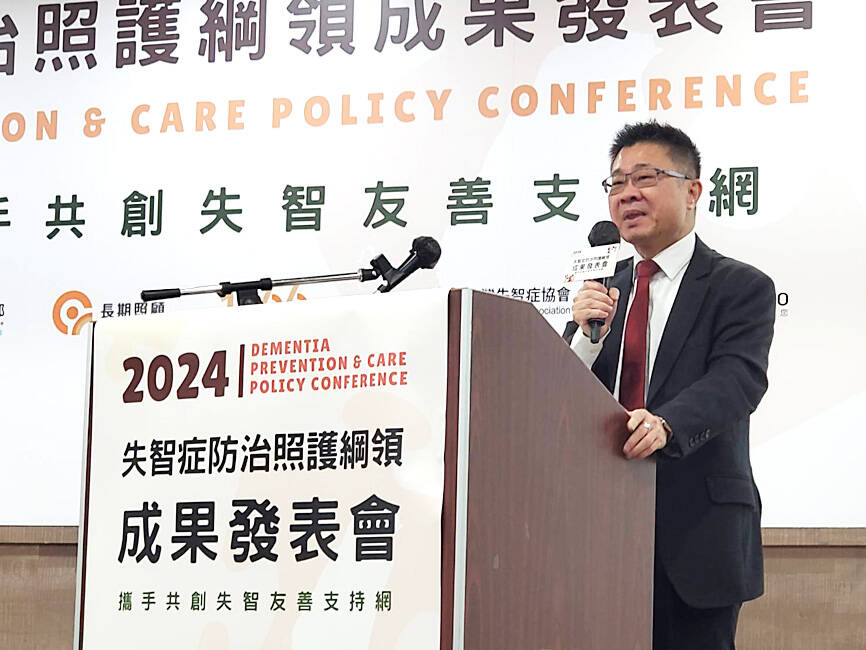The government has approved the first drug specifically targeting dementia, the Ministry of Health and Welfare said at a news conference in Taipei yesterday.
The drug is a major breakthrough and the ministry would work with the National Health Insurance Administration to promote coverage of such drugs, Deputy Minister of Health and Welfare Lue Jen-der (呂建德) said.
There would be more discussions in the coming months on which patients would be able to use the drug, said Hsu Wen-chuin (徐文俊), chairman of the Taiwan Alzheimer’s Disease Association, which cohosted the news conference.

Photo: Lin Hui-chin, Taipei Times
Access to drugs makes a big difference, he said, adding that with more choices, more people would hopefully be willing to undergo early screening to help with diagnosis and intervention.
Current treatment of dementia is focused on treating its symptoms rather than the disease, but the newly approved drug treats dementia directly through intravenous injections, Hsu said.
It is targeted mainly at those with mild impairments, he added.
An 18-month drug clinical trial found that it could delay degeneration by five to seven months, but it is not suitable for asymptomatic or severe cases, he said.
It also has side effects such as bleeding, Hsu said, adding that Alzheimer’s patients with the ApoE 4/4 gene variant are particularly at risk of severe side effects.
Alzheimer’s accounts for 60 percent of dementia cases, and prior to using the drug, people must undergo testing to confirm an Alzheimer’s diagnosis and its severity, as well as genetic testing to confirm its specific markers, Hsu said.
A nationwide study on dementia and disability by the National Health Research Institutes from 2020 to last year found that for those aged 65 or above, the prevalence rate of dementia was 7.99 percent, Department of Long-Term Care head Chu Chien-fang (祝健芳) said.
About 360,000 people have been diagnosed with dementia nationwide, with 17 percent experiencing “extremely minor” symptoms and 34 percent experiencing “minor” symptoms.
President William Lai’s (賴清德) “Healthy Taiwan” policy is committed to reforming dementia care by establishing a unified service system, with a focus on improving accessibility, Lue said.
Because of the COVID-19 pandemic, the expansion of dementia care resources has stagnated at about 500 facilities, failing to keep up with the growth in patient numbers, Chu said.
Starting next year, medical institutions that establish care facilities in their communities would receive expert advice and guidance to provide better care, Chu added.

GEARING UP: An invasion would be difficult and would strain China’s forces, but it has conducted large-scale training supporting an invasion scenario, the report said China increased its military pressure on Taiwan last year and took other steps in preparation for a potential invasion, an annual report published by the US Department of Defense on Wednesday showed. “Throughout 2023, Beijing continued to erode longstanding norms in and around Taiwan by employing a range of pressure tactics against Taiwan,” the report said, which is titled “Military and Security Developments Involving the People’s Republic of China (PRC) 2024.” The Chinese People’s Liberation Army (PLA) “is preparing for a contingency to unify Taiwan with the PRC by force, if perceived as necessary by Beijing, while simultaneously deterring, delaying or denying

PEACEFUL RESOLUTION: A statement issued following a meeting between Australia and Britain reiterated support for Taiwan and opposition to change in the Taiwan Strait Canada should support the peaceful resolution of Taiwan’s destiny according to the will of Taiwanese, Canadian lawmakers said in a resolution marking the second anniversary of that nation’s Indo-Pacific strategy on Monday. The Canadian House of Commons committee on Canada-Chinese relations made the comment as part of 34 recommendations for the new edition of the strategy, adding that Ottawa should back Taiwan’s meaningful participation in international organizations. Canada’s Indo-Pacific Strategy, first published in October 2022, emphasized that the region’s security, trade, human rights, democracy and environmental protection would play a crucial role in shaping Canada’s future. The strategy called for Canada to deepen

QUICK LOOK: The amendments include stricter recall requirements and Constitutional Court procedures, as well as a big increase in local governments’ budgets Portions of controversial amendments to tighten requirements for recalling officials and Constitutional Court procedures were passed by opposition lawmakers yesterday following clashes between lawmakers in the morning, as Democratic Progressive Party (DPP) members tried to block Chinese Nationalist Party (KMT) legislators from entering the chamber. Parts of the Public Officials Election and Recall Act (公職人員選舉罷免法) and Constitutional Court Procedure Act (憲法訴訟法) passed the third reading yesterday. The legislature was still voting on various amendments to the Act Governing the Allocation of Government Revenues and Expenditures (財政收支劃分法) as of press time last night, after the session was extended to midnight. Amendments to Article 4

‘ONE BRIDGE’: The US president-elect met with Akie Abe on Dec. 15 in Florida and the two discussed a potential Taiwan-China conflict’s implications for world peace US president-elect Donald Trump has described Taiwan as “a major issue for world peace” during a meeting with Akie Abe, the widow of late Japanese prime minister Shinzo Abe, Japanese newspaper the Yomiuri Shimbun quoted sources as saying in a report yesterday. Trump met with Akie Abe on Dec. 15 at the Mar-a-Lago estate in Florida, where the two discussed the Russo-Ukrainian war and the situation in the Taiwan Strait. During the meeting, Trump spoke on the implications for world peace of a potential Taiwan-China conflict, which “indicated his administration’s stance of placing importance on dealing with the situation in